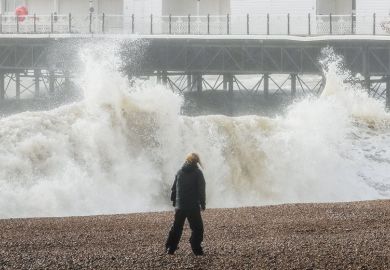UK universities have been urged to stop charging non-refundable deposits to prospective postgraduate students amid warnings that the issue will become increasingly sensitive during the cost-of-living crisis.
The University and College Union said the practice of charging thousands of pounds to applicants wishing to secure their places on taught master’s programmes had developed “under the radar” and was reflective of an “increasingly deregulated admissions process”.
“Institutions can no longer in good conscience oversee a system which restricts access and takes money from those wishing to pursue their education goals,” the union’s general secretary, Jo Grady, wrote in a letter calling on Universities UK president Steve West to review the situation.
The issue was spotlighted recently by a case at the University of Manchester in which an applicant, Rory Wood, complained on social media that he had paid £1,000 to the institution but then decided that he was unable to take his place because he could not afford the living costs. He later died in an apparent suicide, and his friends claimed that the stress of the situation had added to his already poor mental health.
Manchester said in a statement that it had not had any contact with Mr Wood regarding a request for a refund, but the UCU said most universities gave the money back only in limited circumstances, for example within a 14-day period or if an international student was refused a visa.
Dr Grady said it was not clear how institutions set the deposit amount or whether it bore any relation to costs incurred by students not taking up their place. She accused universities of using deposits to “generate income” in a way that could “punish those with access to fewer resources”.
She said that there were “many legitimate reasons” why a student might change their mind about accepting a place and that most of these were excluded by the criteria set for issuing refunds.
“One of the reasons why applicants may not take up a PGT [postgraduate taught] place is due to challenging or changing financial circumstances, and with the cost-of-living crisis biting for many potential applicants, this is likely to become a bigger issue in the next academic year,” she added. Many universities have already decided to raise postgraduate fees by 10 per cent or more for the next intake.
The UCU said it was “appalled” by the issue and called on UUK – which represents 140 institutions – to urge its members to review application processes and remove all non-refundable deposits.
Abolishing such “hidden costs” of further study should be seen as part of a wider agenda to remove barriers to postgraduate courses and ensure a more diverse community, the union said.
A spokesperson for UUK said it was leading work across the sector to “ensure that admissions processes are fair and transparent” and it will be responding to UCU’s letter in due course.
Register to continue
Why register?
- Registration is free and only takes a moment
- Once registered, you can read 3 articles a month
- Sign up for our newsletter
Subscribe
Or subscribe for unlimited access to:
- Unlimited access to news, views, insights & reviews
- Digital editions
- Digital access to THE’s university and college rankings analysis
Already registered or a current subscriber?








